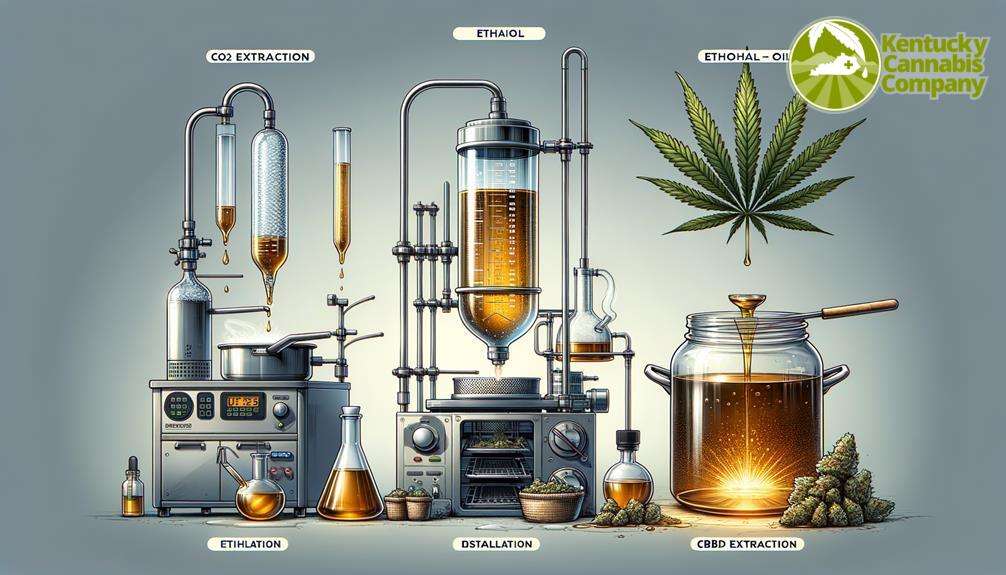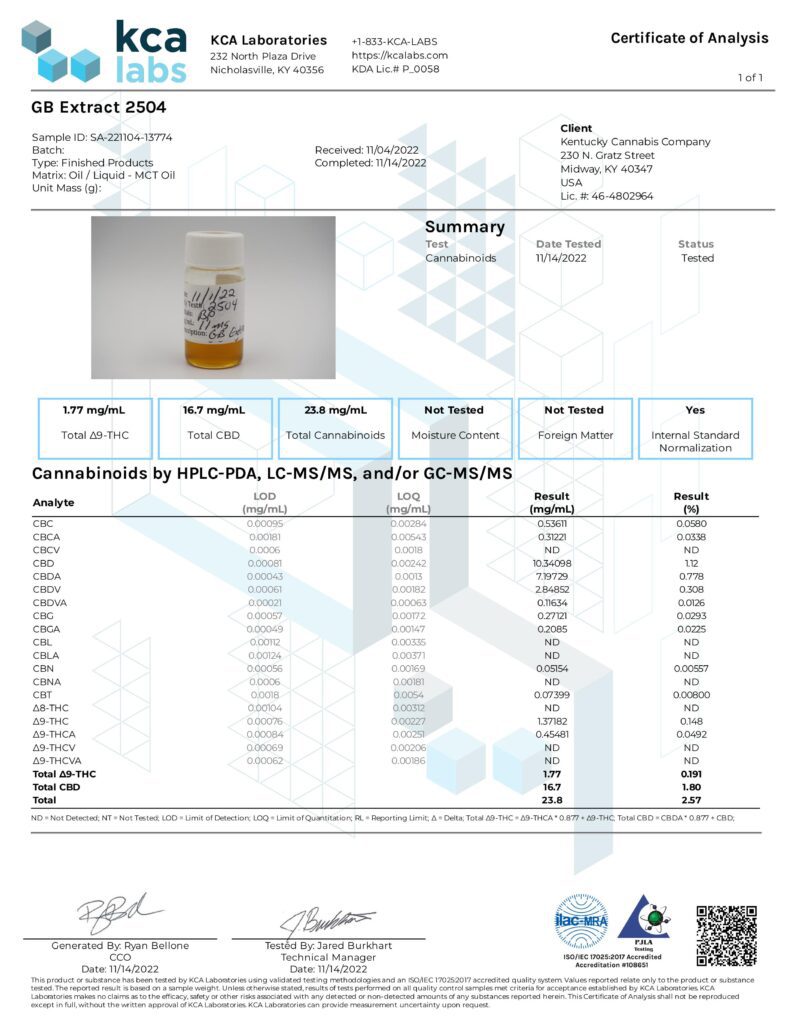
What type of CBD is Most Effective
Just 10 years ago finding CBD was rare at best. Today, 10 years after Kentucky became the first state to start growing hemp again under the Federal Farm bill of 2014, A what would seem as a unlimited choice of products and brand names exists, but only three CBD oil types exist on the market. Out of the three, only one should be considered for personal use. Once you know the difference in the types and how they are made you can quickly see what companies are just marketing to you, and what companies are trying to deliver results. We know what one we like; read on and see what you think.
Types of CBD
There are three main types of CBD oil available, each differing in the way they’re made and what they contain. It’s important to understand these differences because not all CBD products are created equal.
Full Spectrum CBD:
Full Spectrum CBD is the most beneficial type. It’s made using an advanced extraction process that captures a wide range of natural components from the hemp plant. This includes not just CBD, but also other cannabinoids, terpenoids, flavonoids, and essential plant lipids. These elements work together to enhance the overall benefits of the oil, a phenomenon known as the “entourage effect.” Unlike other methods, this process retains these valuable components, offering more comprehensive benefits for the body. Our Genesis Blend CBD Oil is an example of Full Spectrum, containing more than just CBD – it includes 11 other cannabinoids that contribute to its effectiveness. It is made using the bloom of the hemp plant.
Explore our Full-Spectrum CBD Products at Bluegrass Hemp Oil
Broad Spectrum CBD:
Broad Spectrum CBD is similar to Full Spectrum but with one key difference: it contains no THC (the compound known for causing a ‘high’). Also many of the broad spectrum products are void of other cannabinoids such as CBDA. Broad spectrum CBD still offers some benefits of the entourage effect but is less potent compared to Full Spectrum. It’s a middle ground for those who want some of the benefits of Full Spectrum without any THC. However, the removal of THC, often for marketing purposes, reduces its overall effectiveness. This is important for those looking for maximum benefits. Some of these products are also made from biomass.
CBD Isolate:
CBD Isolate is the simplest form of CBD. It is pure CBD, without any other cannabinoids, terpenoids, or flavonoids. While marketed as pure and sometimes as water-soluble, it’s also the the least effective form of CBD. Isolates miss out on the entourage effect because they contain only CBD and none of the other beneficial compounds found in hemp. This means they don’t provide the full range of benefits that Full or Broad Spectrum products do. CBD Isolate is largely made from biomass, ground up hemp and also used in products like delta-8, which have been associated with safety concerns. Hollywood actors such as Tommy Chong and Martha Stewart as well as others market these poor quality products to unwary consumers. They are offered as high mg dosage products. Also many products sold by doctors and in doctors and in pharmacy’s fall under this category. Buyer beware, don’t pay more and get less!
Isolated CBD vs. Oleoresin Extract – The Powerful Differences Exist
Popular CBD Extraction Methods and Their Impact on the Final Product
Extracting CBD from hemp plants is a crucial process, significantly influencing the quality and characteristics of the final product. Different methods lead to different outcomes in terms of purity, potency, and the presence of other compounds. Let’s explore three popular extraction methods: CO2, Isolation, and Hydrocarbon Extraction.
CO2 Extraction
CO2 Extraction uses carbon dioxide under high pressure and low temperature to isolate and maintain the purity of the CBD. This method is highly efficient and safe, ensuring that the final product is potent and free of solvents or unwanted residues. CO2 extraction is versatile and can be adjusted to target specific cannabinoids, resulting in either broad-spectrum or isolate products. However, this method might not capture the full spectrum of beneficial compounds like terpenes and minor cannabinoids as effectively as other methods.
Isolation
Isolation is a process that involves extracting CBD until it is in its purest form, devoid of other cannabinoids, terpenes, and plant compounds. This method produces CBD isolate, a crystalline powder that is 99% pure CBD. While isolates are the purest form of CBD, they lack the synergistic benefits found in full-spectrum products. The absence of other compounds means that users miss out on the ‘entourage effect,’ where multiple compounds work together to enhance the overall effectiveness.
Hydrocarbon Extraction
Hydrocarbon Extraction uses hydrocarbon solvents like butane or propane to extract CBD from the hemp plant. This method is efficient in extracting a wide range of cannabinoids and terpenes, potentially leading to a more robust full-spectrum product. However, the major downside is the risk of solvent residue if not properly purged, which can affect the flavor and safety of the final product. Hydrocarbon extraction requires meticulous processing to ensure the removal of all harmful solvents from the CBD oil. It should only be done by professionals with experience. Kentucky Cannabis Company and Bluegrass Hemp Oil have the longest history of hemp growers in the United States using this method. While popular in the marijuana industry for producing high quality extracts very few use this process in the hemp industry to make high quality products.
Learn about Bluegrass Hemp Oil’s sustainable CBD production and extraction methods.
Each method has its advantages and disadvantages, impacting the final CBD product’s effectiveness, purity, and overall quality. Consumers should consider these differences when choosing a CBD product that best suits their needs and preferences. Most CBD users are looking for maximum results and quality. It is also important to your Endocannabinoid System
Endocannabinoid system (ECS)
Many people ask: “How can CBD offer a wide variety of powerful results for things ranging from anxiety and neurodegeneration to even auto-immune disorders?” Surprisingly, The answer lies not so much in CBD (Cannabidiol) itself but how CBD is working to augment the Endocannabinoid system (ECS).
Therefore, The Endocannabinoid System (endo meaning ‘within’) is a biological system focused on mediating physiological balance, fundamentally known as homeostasis. Some of the first homeostatic functions we often hear from clients are a better night’s sleep, a regulated appetite, and reduced anxiety. These are a few of the first indicators CBD is kicking in and starting to help boost our natural production of endocannabinoids. Learn more about your Endocannabinoid system here.
The Endocannabinoid system is a complex network of receptors and molecules that have been found to be present throughout the human body. It works to maintain homeostasis, the body’s natural state of balance and harmony. The ECS is responsible for regulating many physiological processes such as pain, mood, appetite, sleep, metabolism, immune system, and more. It does this by using different kinds of receptors and molecules, called cannabinoids, which act like messengers to send signals to the body’s other systems.
Cannabinoids are the molecules that are responsible for activating the endocannabinoid system. There are two main types of cannabinoids: endocannabinoids, which are produced naturally by the body, and phytocannabinoids, which are derived from plants such as cannabis. CBD is a phytocannabinoid, and it is thought to interact with the body’s endocannabinoid system in various ways. For example, it may help to reduce inflammation, reduce pain, regulate appetite, and improve mood. Additionally, it is believed that CBD may help to regulate the body’s immune system and improve its overall health.
Learn about the Endocannabinoid System at Bluegrass Hemp Oil
Frequently Asked Questions
1. What are the main types of CBD available?
There are three primary types of CBD products: Full Spectrum, Broad Spectrum, and CBD Isolate.
2. What is Full Spectrum CBD?
Full Spectrum CBD includes a wide range of cannabinoids, terpenes, and other beneficial compounds found in hemp. It may contain trace amounts of THC (less than 0.3%), but this is not enough to produce psychoactive effects. Full Spectrum CBD is known for the ‘entourage effect,’ where all compounds work synergistically, potentially enhancing the oil’s therapeutic benefits.
3. How does Broad Spectrum CBD differ from Full Spectrum?
Broad Spectrum CBD contains a range of cannabinoids and terpenes like Full Spectrum, but it has all traces of THC removed. It’s a good option for those who want the benefits of the entourage effect without any THC.
4. What is CBD Isolate?
CBD Isolate is the purest form of CBD, usually 99% pure, and does not contain any other cannabinoids, terpenes, or plant compounds. It’s typically used in products where the sole focus is on CBD without the influence of other hemp-derived compounds. Should be for lab use and not for use in humans.
5. Does Full Spectrum CBD have any psychoactive effects?
No, Full Spectrum CBD does not have psychoactive effects. The THC levels in Full Spectrum CBD are below 0.3%, which is not enough to produce a ‘high’.
6. Is Broad Spectrum CBD effective as Full Spectrum?
Broad Spectrum CBD can be effective, but it may lack the full entourage effect seen in Full Spectrum due to the absence of THC. Some studies suggest that the presence of THC, even in small amounts, enhances the efficacy of CBD.
7. Who should use CBD Isolate?
CBD Isolate is ideal for individuals who must avoid all traces of THC (e.g., due to drug testing) or who are sensitive to other hemp compounds. It’s also used in certain medical contexts where high doses of pure CBD are required, as in a lab setting.
8. Can I use Full Spectrum CBD if I am drug tested?
There’s a small risk that the trace amounts of THC in Full Spectrum CBD could show up on a drug test. If you’re subject to drug testing, Broad Spectrum or CBD Isolate might be safer choices. However these molacules are close in shape and could still create a false positive in a drug screen.
9. Are there any side effects of using CBD products?
CBD is generally well-tolerated, but some people may experience no effects. It’s always best to consult with a healthcare provider before starting any new supplement.
10. How do I choose the right type of CBD for me?
Your choice depends on your individual needs and concerns. Consider factors like your sensitivity to THC, the legal status of THC in your area, and whether you’re subject to drug testing. Consult with a healthcare professional if you’re unsure.

